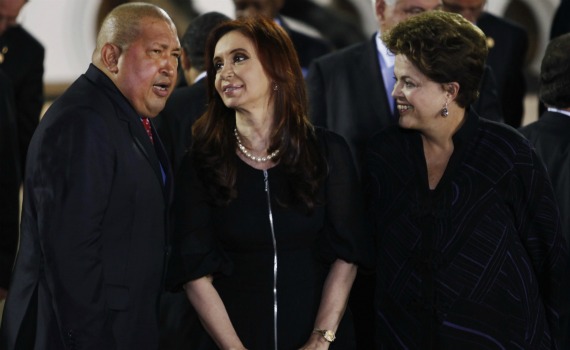2011 Trends in Latin America: The Region’s Presidents Battle Cancer
More on:

As 2011 comes to an end, I want to reflect on just a few trends affecting the region over the course of the past year. While these developments certainly have long histories, they have all become more noticeable – and noteworthy – in 2011. To keep it interesting, I will be posting one trend a day for the rest of this week, so check back -- and let me know what you’d add to the list in the comments or via my twitter account (@latintelligence).
This hasn’t been a good year health-wise for Latin American leaders. Cristina Kirchner’s recent diagnosis of thyroid cancer is just the latest. The most mysterious, and politically game-changing health challenge is that of Hugo Chávez. Officially, Cuban doctors removed a reportedly “aggressive” pelvic tumor in June, and since then he has undergone chemotherapy and steroid treatment. Though he claims to have conquered the disease, others (including his former doctor) say he may not live more than two years.
Last year, Paraguayan President Fernando Lugo was diagnosed with non-Hodgkin’s lymphoma, and spent four months in chemotherapy and in and out of hospitals. According to the most recent tests, his cancer is in remission. In Brazil, President Dilma Rousseff continues some treatment for lymphatic cancer (discovered during her 2010 presidential campaign) and former President and still political heavyweight Luiz Inácio Lula da Silva has just begun his final round of chemo for throat cancer (diagnosed in October). Pictures of the famously bearded leader now show him hairless, though still beaming. There were also rumors circulating that Evo Morales had a cancerous tumor in his nose, though this was never proven.
This type of illness has idiosyncratic, but nevertheless real effects on politics. It can weaken a politician due to their physical absence from the public limelight as well as political backroom negotiations. Lula’s Worker’s Party (PT) will sorely miss his active leadership, especially in the run up to local elections in 2012. Kirchner is expected to make a quick recovery after surgery, though she will turn power over to her Vice President Amado Boudou (a close political confidant) for three weeks in January. It remains to be seen whether these absences will make a significant mark on either country’s internal politics.
Javier Corrales, a political scientist at Amherst, has written about a different role for illness, and its potential to strengthen rather than diminish the political patient. Calling it “participatory cancer” he chronicles Chávez’s attempts to turn his illness from a disadvantage to an electoral strength. By brandishing cancer and his fight as an electoral gimmick, the Venezuelan leader distracts voters from more serious problems (such as a floundering economy and rising crime).
While continuing to watch the political fallout, let’s hope the new year brings health to all.
More on:
 Online Store
Online Store
